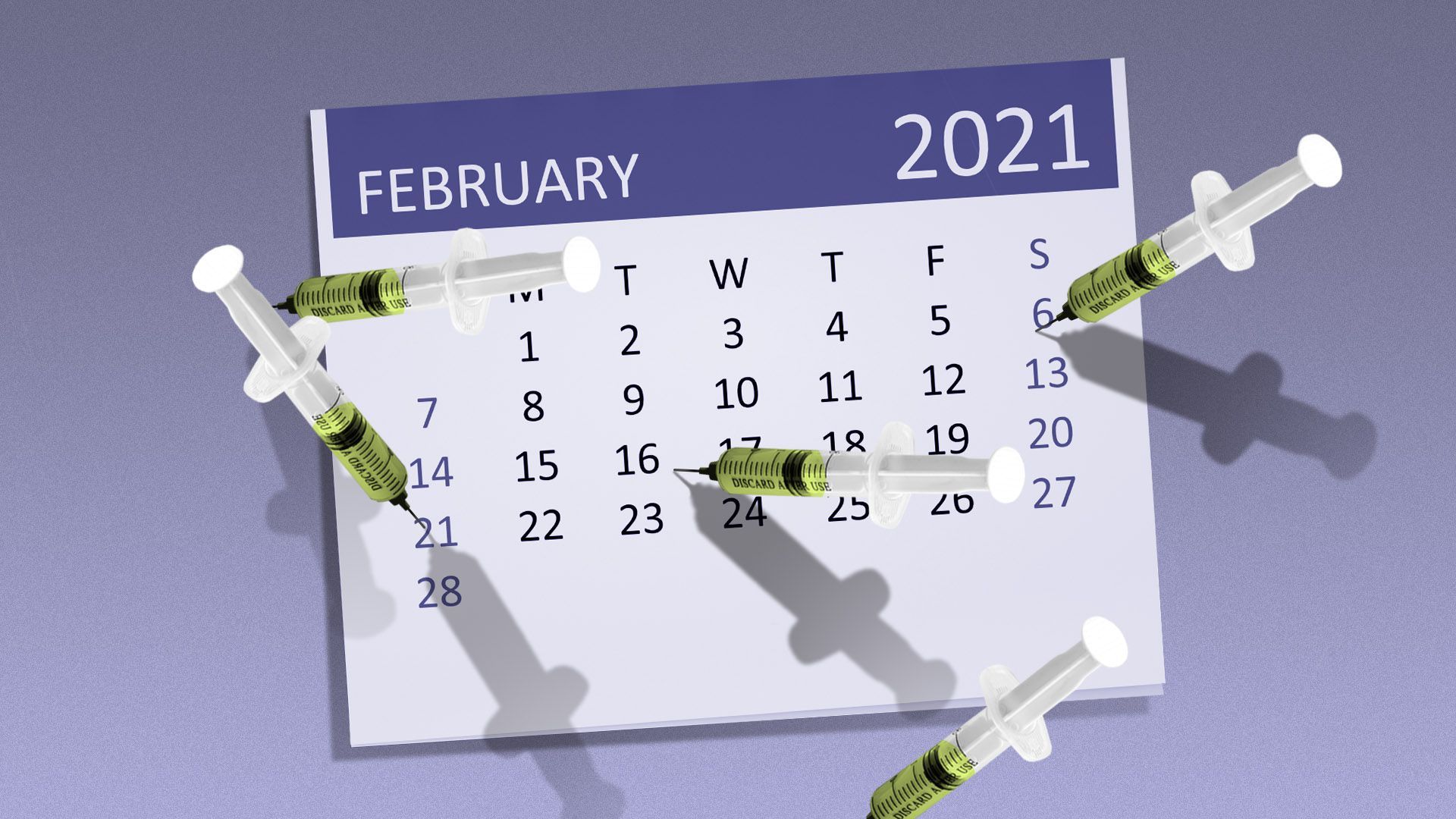| | | | | | | Presented By PhRMA | | | | Vitals | | By Caitlin Owens ·Feb 02, 2021 | | Good morning. Today's word count is 1,063, or a 4-minute read. | | | | | | 1 big thing: Vaccine chaos may undermine second doses |  | | | Illustration: Sarah Grillo/Axios | | | | Some of the same problems that have plagued the coronavirus vaccine rollout could also make it harder for people to get the second dose of the vaccines. Why it matters: The two vaccines authorized so far both require two shots to reach the full potential of their protection, and those second shots need to happen within a specific window of time —putting extra pressure on a system that's already struggling to work out its kinks. What's next: This week will be "when we're really starting to scale up to the second dose ... the challenge is going to be about the availability of inventory and scheduling," Louisville Mayor Greg Fischer said in an interview. - "Unlike the first dose, you've gotta get the second dose within that time window, so there's a little more criticality to it," he added.
The problem: Some states say they don't have enough visibility into how many doses of vaccine they are getting from the federal government, and when. - "You need to have information on that entire supply chain," said Celine Gounder, a professor at NYU Grossman School of Medicine. "Forget second doses, we just don't know where doses are."
Where it stands: Nationally, about 8% of the population has received at least one dose of the vaccine, and less 2% have received both shots, per Bloomberg. - Scheduling is also an issue. States and localities that used Eventbrite or other first-come, first-served systems may not have an easy way to guarantee appointments for second doses.
The other side: Some health officials and providers feel confident that they'll be able to make the second dose process run smoothly. - This often comes down to being able to successfully pull off the little things, like differentiating online between first dose appointments and second dose appointments or scheduling second dose appointments at the same time patients receive their first dose.
Go deeper. |     | | | | | | 2. New strains, not school spread, drive virus fears |  Data: Axios/Ipsos survey; Chart: Axios Visuals Americans are deeply worried about new strains of the coronavirus — prompting some to double-mask and many to temper expectations about life getting back to normal — according to the latest installment of the Axios/Ipsos Coronavirus Index. The big picture: Fears have eased substantially around sending children back to school, our national survey found. But there's growing anxiety about the virus changing and the implications for the nation's health, economy and society, Axios' Margaret Talev writes. - 83% of Americans say they're concerned about new strains that may be more transmissible — with about one-third of that group saying they're "extremely" concerned.
- Only 26% expect life to return to pre-COVID normal in the next six months; 30% predict it will be more than a year; and 8% say "never."
Why it matters: The findings suggest that Americans across partisan lines are increasingly attuned to the science around the virus — and that they don't expect vaccines or the Biden administration to bring instant fixes. What we're watching: Since late August — the last time we asked this question — Americans have grown more comfortable with the idea of schools re-opening in their communities. - 59% saying they have some level of concern, down from 74%, and only one-third now feel extremely or very concerned, down from half.
- There are still big partisan differences, with Democrats about twice as worried as Republicans.
Go deeper. |     | | | | | | 3. CDC: Vaccine database paints incomplete picture |  Data: CDC; Chart: Danielle Alberti/Axios Race and ethnicity data were spotty during the first month of coronavirus vaccinations, according to a new report from the Centers for Disease Control and Prevention. Why it matters: Collecting accurate demographic data will become more important as vaccines become available to the general public, where the pandemic has taken a disproportionate toll on Black and Hispanic Americans, Axios' Marisa Fernandez reports. By the numbers: No demographic data was available for about half of the initial vaccinations, and the CDC cautioned against drawing firm conclusions from the data that were available. - Many of the demographic data from the first month of vaccinations mirror the demographics of the two groups eligible for those initial vaccines — health care workers and residents of long-term care facilities.
- Vaccine recipients in the first month were mostly female, and 40% were non-white. Roughly 13% of the health care workforce is Hispanic, according to the CDC — as were 12% of the people vaccinated in the first month.
- Black Americans appear to be under-represented, relative to their share of the health care workforce and long-term care population — but people checking the "other" box were dramatically over-represented, making it hard to reach broad conclusions, the CDC said.
What's next: The Biden administration has included race and ethnicity in new reporting requirements, and that will be key to tracking America's progress — or lack of progress — on racial disparities. |     | | | | | | A message from PhRMA | | Biopharma is committed to being a part of the solution | | |  | | | | As we usher in a new administration and Congress, there are many things on which we can all agree, like building a more just, equitable society. | | | | | | 4. Biden's 100-day school goal smacks into reality | | Some White House political advisers are privately concerned President Biden may not be able to meet his goal to reopen schools within his first 100 days, yet the president himself remains committed to it, people familiar with the matter tell Axios' Hans Nichols and Alayna Treene. The big picture: Biden's team is grappling with some reopening challenges advisers didn't foresee in December, when Biden made his explicit 100-day promise. They include delays in vaccine rollouts and the emergence of new virus strains. - Some White House political advisers fear that if they push schools to reopen and the new variants run rampant, they may be forced to shutter classrooms again, as happened in Europe.
The intrigue: Anthony Fauci, director of the National Institute of Allergy and Infectious Diseases, has already tried to publicly walk back Biden's 100-day goal. - "That may not happen because there may be mitigating circumstances," he told teachers unions last Thursday.
Biden's initial goal, articulated in early December, was "that the majority of our schools can be open by the end of my first 100 days." - On his first full day in office, Biden changed his marker, suggesting it only applied to grades K-8 and not high school.
- The president has always made his goal contingent on Congress passing enough funds to ensure teachers could instruct students safely.
Senate Minority Leader Mitch McConnell is planning to focus on schools during floor remarks this week, according to a source familiar with his plans. Go deeper. |     | | | | | | 5. Catch up quick |  | | | Illustration: Aïda Amer/Axios | | | | Coronavirus deaths are starting to decline in every region of the U.S., Bloomberg reports. The coronavirus may be linked to the onset of diabetes, the Washington Post reports. A House panel is launching an investigation into meatpacking giants JBS, Tyson Foods and Smithfield Foods regarding the coronavirus outbreaks at their plants — plus OSHA's oversight of industry working conditions. A group of 10 Senate Republicans that are seeking a compromise on a COVID-19 relief package released the details of their $618 billion proposal Monday, ahead of a meeting with Biden. The EU's slow vaccine rollout has shed unflattering light on the European Commission and its president, Ursula von der Leyen, Axios' Dave Lawler writes. |     | | | | | | A message from PhRMA | | We are committed to being a part of the solution | | |  | | | | America's biopharmaceutical companies are committed to ending the pandemic by: - Continuing to develop treatments and vaccines to combat COVID-19,
- Working closely with governments, insurers and others to make sure vaccines and treatments are accessible and affordable.
| | | | | | Axios thanks our partners for supporting our newsletters.
Sponsorship has no influence on editorial content. Axios, 3100 Clarendon Blvd, Suite 1300, Arlington VA 22201 | | | You received this email because you signed up for newsletters from Axios.
Change your preferences or unsubscribe here. | | | Was this email forwarded to you?
Sign up now to get Axios in your inbox. | | | | Follow Axios on social media:    | | | | | |







No comments:
Post a Comment